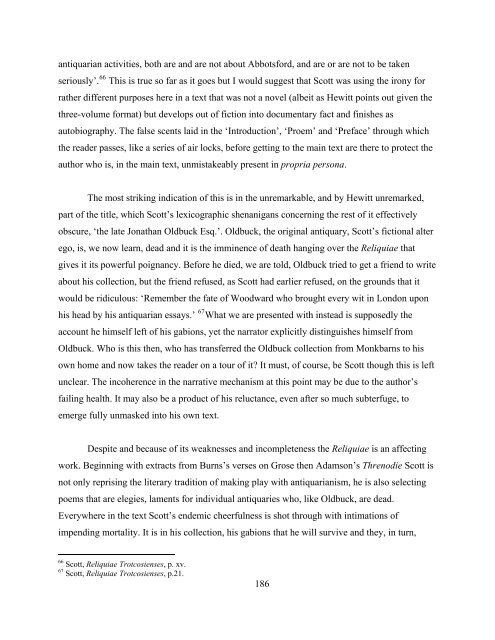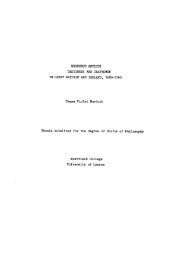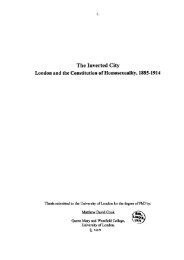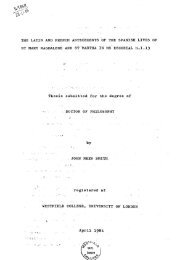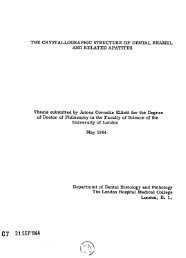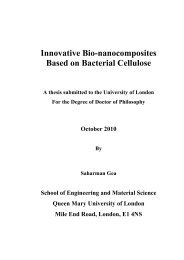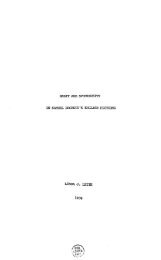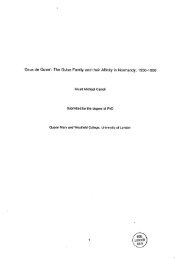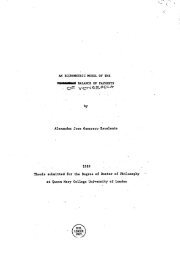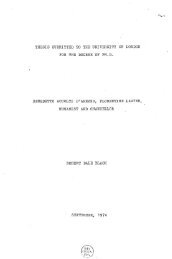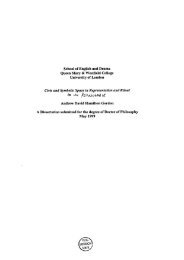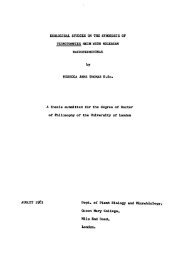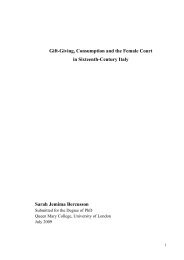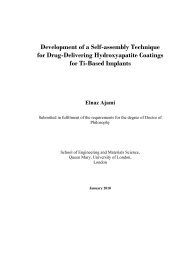Antiquaries in the Age of Romanticism: 1789-1851 - Queen Mary ...
Antiquaries in the Age of Romanticism: 1789-1851 - Queen Mary ...
Antiquaries in the Age of Romanticism: 1789-1851 - Queen Mary ...
Create successful ePaper yourself
Turn your PDF publications into a flip-book with our unique Google optimized e-Paper software.
antiquarian activities, both are and are not about Abbotsford, and are or are not to be taken<br />
seriously’. 66 This is true so far as it goes but I would suggest that Scott was us<strong>in</strong>g <strong>the</strong> irony for<br />
ra<strong>the</strong>r different purposes here <strong>in</strong> a text that was not a novel (albeit as Hewitt po<strong>in</strong>ts out given <strong>the</strong><br />
three-volume format) but develops out <strong>of</strong> fiction <strong>in</strong>to documentary fact and f<strong>in</strong>ishes as<br />
autobiography. The false scents laid <strong>in</strong> <strong>the</strong> ‘Introduction’, ‘Proem’ and ‘Preface’ through which<br />
<strong>the</strong> reader passes, like a series <strong>of</strong> air locks, before gett<strong>in</strong>g to <strong>the</strong> ma<strong>in</strong> text are <strong>the</strong>re to protect <strong>the</strong><br />
author who is, <strong>in</strong> <strong>the</strong> ma<strong>in</strong> text, unmistakeably present <strong>in</strong> propria persona.<br />
The most strik<strong>in</strong>g <strong>in</strong>dication <strong>of</strong> this is <strong>in</strong> <strong>the</strong> unremarkable, and by Hewitt unremarked,<br />
part <strong>of</strong> <strong>the</strong> title, which Scott’s lexicographic shenanigans concern<strong>in</strong>g <strong>the</strong> rest <strong>of</strong> it effectively<br />
obscure, ‘<strong>the</strong> late Jonathan Oldbuck Esq.’. Oldbuck, <strong>the</strong> orig<strong>in</strong>al antiquary, Scott’s fictional alter<br />
ego, is, we now learn, dead and it is <strong>the</strong> imm<strong>in</strong>ence <strong>of</strong> death hang<strong>in</strong>g over <strong>the</strong> Reliquiae that<br />
gives it its powerful poignancy. Before he died, we are told, Oldbuck tried to get a friend to write<br />
about his collection, but <strong>the</strong> friend refused, as Scott had earlier refused, on <strong>the</strong> grounds that it<br />
would be ridiculous: ‘Remember <strong>the</strong> fate <strong>of</strong> Woodward who brought every wit <strong>in</strong> London upon<br />
his head by his antiquarian essays.’ 67 What we are presented with <strong>in</strong>stead is supposedly <strong>the</strong><br />
account he himself left <strong>of</strong> his gabions, yet <strong>the</strong> narrator explicitly dist<strong>in</strong>guishes himself from<br />
Oldbuck. Who is this <strong>the</strong>n, who has transferred <strong>the</strong> Oldbuck collection from Monkbarns to his<br />
own home and now takes <strong>the</strong> reader on a tour <strong>of</strong> it? It must, <strong>of</strong> course, be Scott though this is left<br />
unclear. The <strong>in</strong>coherence <strong>in</strong> <strong>the</strong> narrative mechanism at this po<strong>in</strong>t may be due to <strong>the</strong> author’s<br />
fail<strong>in</strong>g health. It may also be a product <strong>of</strong> his reluctance, even after so much subterfuge, to<br />
emerge fully unmasked <strong>in</strong>to his own text.<br />
Despite and because <strong>of</strong> its weaknesses and <strong>in</strong>completeness <strong>the</strong> Reliquiae is an affect<strong>in</strong>g<br />
work. Beg<strong>in</strong>n<strong>in</strong>g with extracts from Burns’s verses on Grose <strong>the</strong>n Adamson’s Threnodie Scott is<br />
not only repris<strong>in</strong>g <strong>the</strong> literary tradition <strong>of</strong> mak<strong>in</strong>g play with antiquarianism, he is also select<strong>in</strong>g<br />
poems that are elegies, laments for <strong>in</strong>dividual antiquaries who, like Oldbuck, are dead.<br />
Everywhere <strong>in</strong> <strong>the</strong> text Scott’s endemic cheerfulness is shot through with <strong>in</strong>timations <strong>of</strong><br />
impend<strong>in</strong>g mortality. It is <strong>in</strong> his collection, his gabions that he will survive and <strong>the</strong>y, <strong>in</strong> turn,<br />
66 Scott, Reliquiae Trotcosienses, p. xv.<br />
67 Scott, Reliquiae Trotcosienses, p.21.<br />
186


